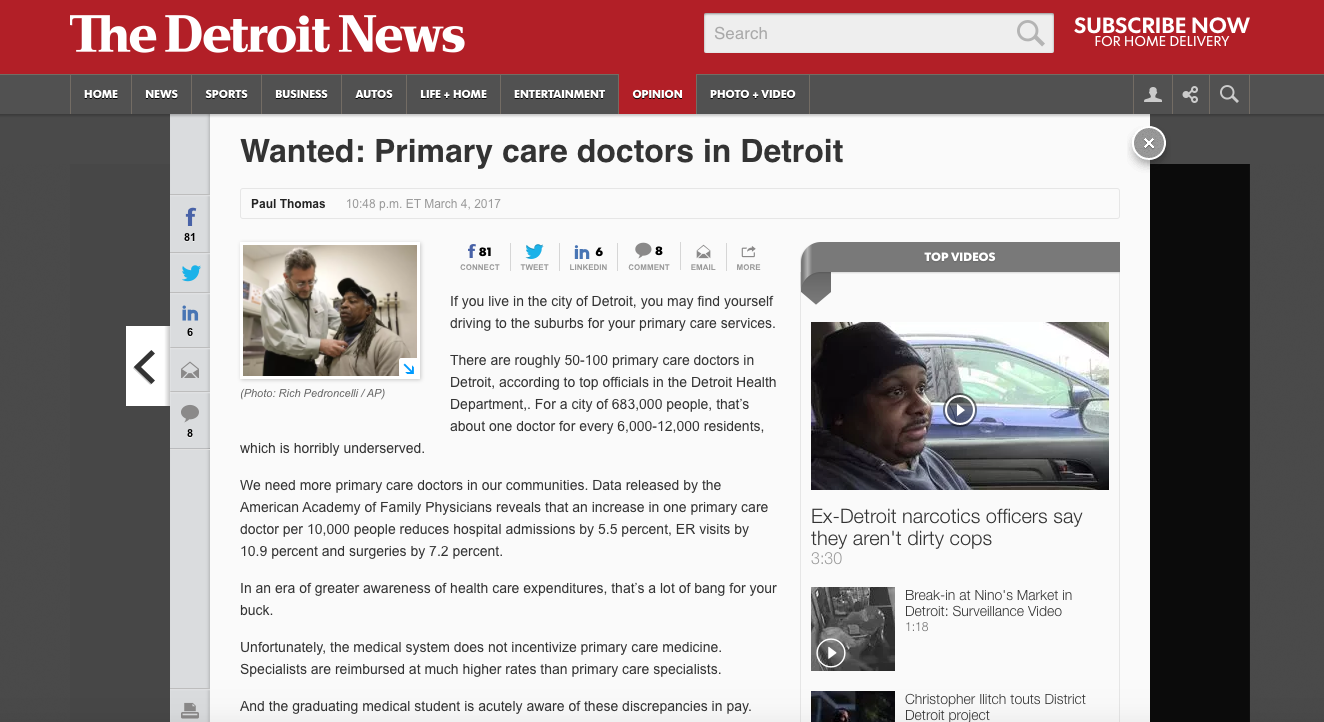Plum Health Blog
Distribute the Johnson and Johnson Coronavirus Vaccine to Doctors
Pull up a chair, have a seat, and grab the newspaper 📰 our Opinion is in the Detroit News!
We believe that healthcare should be affordable and accessible, and part of that includes making sure that the vaccine 💉 is available at primary care offices across the city and region.
You see, people have a high degree of trust in their doctors 🥼 so let us help educate and vaccinate, but we need the vaccine on hand to make this work.
Just about every day this week, a different patient has asked me when they’ll be able to get the vaccine from our office. Our patients are used to getting vaccinated here in our Plum Health DPC clinic -we vaccinate folks every day to prevent the flu, shingles, cervical cancer, hepatitis, and more. Our patients come to expect that they can get the vaccine from our clinic, any vaccine.
So you can imagine their surprise when we tell them that we don’t have the vaccine on hand.
You can read our full opinion on the Detroit News, here.
Special thanks to David Wright, medical student at Wayne State University School of Medicine for helping me write this article.
Opinion Published in the Detroit News
Our opinion regarding Health Insurance and Health Care was published in the Detroit News last night, and it is currently on the front of the Opinion Page!
Our opinion made the top of the page for the Detroit News Opinion section on June 5th 2017.
Here's our opinion in full:
Health insurance does not equal health care. As Americans, we often conflate these two entities. But they are in fact separate.
Health care is when you see your doctor. They listen to your story, empathize, perform a physical exam, make a diagnosis, and discuss treatment options. They can also order tests and give you medications. The compassion, the sincerity, the relationship — that’s health care. Health insurance is what covers you in the case of a medical catastrophe, like if you’re involved in an accident, have a heart attack or a stroke. Health insurance is a financial tool to prevent you from going bankrupt in case these catastrophic events occur.
These may seem like obvious statements, but we’ve grown accustomed to a system in which health insurance covers everything, from flu shots to ICU. This may not be a terrible thing; we all need flu shots, and some of us may end up needing ICU care. The problem exists in how we pay for these services.
If we continue to ask insurance companies like Blue Cross Blue Shield and government entities like Medicaid and Medicare to pay for all of our health care services, from blood pressure medications to cardiac bypass surgery, costs will continue to be inflated.
So if you’re paying $10 for your lisinopril each month, know that it actually costs $0.37. If you’ve paid $120 to check your cholesterol this year, know that it actually costs about $6.55. If you’ve ever paid $150 for a chest X-ray, it actually costs about $40. When we use our insurance cards to pay for the basic, routine health care services, prices are inflated. Fortunately, we now have a choice, an opportunity to use free market principles to save money on our health care services. More Direct Primary Care clinics are popping up in Michigan and across the nation.
Direct Primary Care doctors ask that patients pay a monthly membership, which allows them unlimited visits with their doctor and the ability to call, text or email the doctor any time. These doctors also provide wholesale medications, at-cost labs, and at-cost imaging services. By cutting out the middle man and asking consumers to pay for their basic services, the cost of these basic services decrease. Typical savings for medications, labs and imaging services range from 50 percent to 90 percent.
Ideally, people will pair DPC services with a health insurance plan that fits their needs and their budget, and covers them in case of a catastrophic event.
Paul Thomas, M.D., is a family doctor at Plum Health Direct Primary Care.
A screenshot from our Opinion in the Detroit News on June 5th, 2017.
Thank you for reading and have a wonderful day,
Dr. Paul Thomas with Plum Health Direct Primary Care in Detroit, Michigan
Opinion Published in the Detroit News
This week I wrote an opinion piece and it was published by the Detroit News! I'm very excited about getting the word out about the benefits of Primary Care and the work that needs to be done to address the health disparities in our city and in our region. Here's the link. A sincere thank you to Ingrid Jacques for giving me the opportunity to write this.
There are always constraints, with time and with resources, and the article was edited to fit the allotted space in the Sunday paper. So, here is the essay that I wrote in its entirety prior to editing by the News:
If you live in the City of Detroit, you may find yourself driving to the suburbs for your primary care services.
According to top officials in the Detroit Health Department, there are roughly 50 – 100 primary care doctors in Detroit. For a city of 683,000 people, that’s about 1 doctor for every 6,000 – 12,000 residents, which is horribly underserved.
Interestingly, Wayne County as a whole has 1 primary care doctor for every 1,515 residents. But, the supply of doctors is not equitably distributed across communities within Wayne County. Areas like Grosse Pointe and Dearborn have a relative saturation, while cities like Inkster and Detroit remain underserved.
By contrast, Washtenaw County has 1 primary care doctor for every 598 residents and Oakland County has 1 primary care doc for every 655 residents. These are more equitable and desirable ratios.
We need more primary care doctors in our communities. Research has shown that as the number of primary care doctors increases, health outcomes improve and costs decrease.
Data released by the American Academy of Family Physicians reveals that an increase in one primary care doctor per 10,000 people reduces hospital admissions by 5.5%, ER visits by 10.9% and surgeries by 7.2%.
In an era of greater awareness of healthcare expenditures, that’s a lot of bang for your buck.
Unfortunately, the medical system does not incentivize primary care medicine. Specialists like Orthopedists, Cardiologists and Dermatologists are reimbursed at much higher rates than primary care specialists like Family Medicine doctors, General Internal Medicine doctors and Pediatricians.
And the graduating medical student is acutely aware of these discrepancies in pay. The median level of med school debt for the class of 2015 was $183,000 and the total cost may surpass $400,000 if paid over the long term with interest.
As the average student considers an average salary of $443,000 as an Orthopedist or $204,000 as a Pediatrician, choosing primary care medicine becomes economically strenuous.
And for those doctors who choose primary care specialties, primary care offices are often set up in more affluent neighborhoods where the reimbursement levels are higher. These location selection decisions are often out of the hands of individual doctors and dictated by corporate, profit-driven health systems.
This suburbanization of primary care medical services has had a terrible effect for Detroit’s residents. WalletHub recently ranked the City of Detroit as the least healthy major city in the United States, ranking 150 out of 150.
After the WalletHub list was published, the former Health Department Director was quoted in a Detroit News article: “Detroit health chief Dr. Abdul El-Sayed wasn’t surprised with the results, which he blamed partly on the lack of doctor’s offices in neighborhoods, healthy food stores, transportation and safe places to exercise.”
But, there is hope. The longstanding work of free and low cost clinics like CHASS, the Student Run Free Clinic, HUDA, and Joy-Southfield Clinics should be acknowledged. It is also encouraging that the Michigan State University of Osteopathic Medicine Popoff Clinic on Mack Avenue on the East Side is complimenting these stalwarts. Additionally, a Direct Primary Care service, Plum Health DPC, in Southwest Detroit/Corktown is providing another option for Detroit residents.
Finally, as Downtown, Midtown and New Center become more sustainable, primary care services should begin to take hold with potential spill over benefits for adjacent neighborhoods.
Paul Thomas, MD
Family Medicine Doctor with Plum Health DPC
Thank you for reading, and have a wonderful day,
- Paul Thomas, MD
A newspaper clipping from this Sunday's Detroit News about health care and health disparities in the city of Detroit and the potential solutions to address them.









